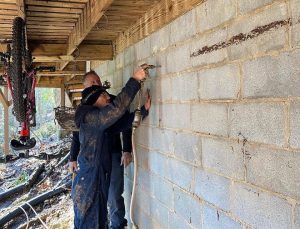
Pest control might not seem like a topic for ethical debates, but it’s more complex than it looks. On one hand, pests can threaten crops, spread diseases, and damage property—problems we can’t ignore. On the other hand, the methods we use to manage them often come with environmental consequences, from harming beneficial insects to polluting ecosystems.
Striking the right balance between protecting human needs and safeguarding the environment is no small task. How can we tackle pest problems without causing more harm than good? Exploring the ethical side of pest control opens up a bigger conversation about responsibility, sustainability, and the choices we make for the future.
What are the long-term effects of pesticide use on the environment?
The long-term use of pesticides can have several harmful effects on the environment, including:
- Soil Contamination: Pesticides can accumulate in the soil, affecting its fertility and health. Over time, this can reduce soil biodiversity and harm beneficial organisms like earthworms, crucial in nutrient cycling and soil structure.
- Water Pollution: Pesticides can leach into groundwater or runoff into rivers, lakes, and oceans, contaminating water sources. This can harm aquatic life, disrupt ecosystems, and affect the quality of drinking water for humans and animals.
- Loss of Biodiversity: Pesticides are not selective and can kill many organisms, including pollinators like bees, butterflies, and other beneficial insects. The loss of these species can disrupt ecosystems, affecting plant reproduction and food chains.
- Resistance Development: Overusing pesticides leads to the development of pesticide-resistant pests, which require stronger and more toxic chemicals to control them. This creates a cycle of escalating chemical use and environmental harm.
- Disruption of Ecosystem Balance: Pesticides can disrupt the natural balance of ecosystems by eliminating natural predators and competitors of pests. This can lead to the overpopulation of certain species and further environmental imbalances.
These effects can lead to reduced ecosystem services, biodiversity loss, and increased challenges for sustainable agriculture and environmental health.
How can I control pests in a more eco-friendly way?
Controlling pests in an eco-friendly way involves using sustainable practices that minimize environmental harm, non-target species, and human health. Here are some strategies to control pests more responsibly:
- Integrated Pest Management (IPM): This approach combines multiple strategies, including prevention, monitoring, and control methods, with minimal chemical use. IPM focuses on understanding pest behavior and using non-toxic methods like trapping, barriers, and biological control before resorting to pesticides.
- Natural Predators: Introduce or encourage natural predators like ladybugs, birds, and beneficial insects (e.g., nematodes) that can help reduce pest populations. These natural allies can control pests without harming the environment.
- Diatomaceous Earth: This natural substance, made from fossilized remains of tiny aquatic organisms, can be sprinkled in areas where pests are found. It dehydrates and kills pests like ants, cockroaches, and fleas but is safe for humans and pets.
- Organic Pesticides: Use non-synthetic, organic pesticides from natural ingredients like neem oil, insecticidal soap, or essential oils (e.g., peppermint, citronella). These options are less harmful to the environment than conventional chemical pesticides.
- Physical Barriers: Use physical barriers such as nets, traps, or fences to keep pests out of gardens or homes. Sealing cracks, adding screens to windows, and using mulch can also help prevent pests from entering buildings.
- Companion Planting: Certain plants can naturally repel pests or attract beneficial insects in gardens. For example, planting marigolds can deter nematodes, while basil can repel mosquitoes.
- Proper Waste Management: Properly storing food and waste can help keep your environment clean and prevent the attraction of pests like rodents and ants. Regularly removing garbage and maintaining a tidy space also reduces pest habitats.
- Crop Rotation and Soil Health: In gardening and farming, rotating crops and maintaining healthy soil reduces the risk of pest infestations and disease, promoting a balanced ecosystem.
These eco-friendly pest control methods prioritize sustainability, reducing the need for toxic chemicals and minimizing the long-term environmental impact.
Are there ethical concerns with using traps to catch and kill pests?
Yes, there are ethical concerns with using traps to catch and kill pests, as this method can raise questions about the treatment of animals and the humane aspects of pest control. Some of the main concerns include:
- Suffering and Stress: Many traps, especially those used for rodents, can cause prolonged suffering or stress before the pest dies. For example, snap traps or glue boards can lead to painful injuries, dehydration, or slow death, which is considered inhumane by some animal welfare advocates.
- Non-Target Species: Traps can inadvertently capture non-target species, including beneficial insects, pets, or even wildlife. This can lead to unnecessary harm to animals that are not the intended target and disrupt ecosystems.
- Lack of Quick Death: Some traps may not kill pests instantly, resulting in prolonged suffering. For instance, live traps require euthanasia, which may not always be conducted quickly or humanely, especially if the pest is released into an unfamiliar environment without adequate survival resources.
- Environmental Impact: Trap traps that require chemical baits or toxic substances can have negative environmental consequences, especially if these substances leach into soil or water. The impact on local wildlife and ecosystems is a concern when such traps are used in natural settings.
- Ethical Alternatives: Ethical considerations lead many to seek non-lethal or more humane alternatives to trapping, such as using deterrents, physical barriers, or eco-friendly pest management techniques like integrated pest management (IPM), which focuses on prevention and natural control methods.
While traps can provide effective pest control, they may not always align with ethical standards regarding animal welfare. Choosing humane or non-lethal methods and considering the broader environmental impact is key to addressing these ethical concerns.
What are the potential health risks associated with chemical pest control?
Chemical pest control, while effective, can pose several health risks to humans, animals, and the environment. Some of the potential health risks include:
- Respiratory Issues: Exposure to pesticide chemicals, especially during application, can cause respiratory problems such as coughing, wheezing, or shortness of breath. Inhaling fumes or dust from chemicals may irritate the lungs and exacerbate conditions like asthma or allergies.
- Skin Irritation: Direct pesticide contact can cause skin irritation, rashes, or burns. Some chemicals may also cause allergic reactions, leading to more severe symptoms like swelling, hives, or difficulty breathing.
- Long-Term Health Effects: Prolonged exposure to certain chemicals, especially chronic pesticide use, can have long-term effects on human health. Some pesticides are linked to cancer, reproductive issues, hormonal disruptions, and neurological disorders. For example, some organophosphates and carbamates can damage the nervous system over time.
- Poisoning: Accidental ingestion or improper handling of pesticides can lead to poisoning, which can be especially dangerous for children or pets who may come into contact with treated surfaces. Symptoms of poisoning can include nausea, dizziness, vomiting, headaches, and, in severe cases, death.
- Environmental Contamination: Pesticides can contaminate soil, water, and air, leading to broader environmental health risks. Contaminated water sources may harm aquatic life, and chemicals that leach into the soil can affect plant growth and soil fertility, potentially impacting the food chain.
- Impact on Beneficial Insects: While chemical pest control targets harmful pests, it can also harm beneficial insects like bees, butterflies and natural predators such as ladybugs. This disruption can affect pollination, soil health, and ecosystem balance, which may harm human health by reducing biodiversity and food production.
- Chemical Resistance: Pests may resist chemicals over time, requiring stronger or more toxic substances to control them. This creates a vicious cycle of increasing toxicity and escalating health risks.
Many individuals and businesses are turning to eco-friendly and integrated pest management (IPM) strategies that rely on less toxic and more sustainable pest control methods to mitigate these risks.
Make Ethical Choices in Pest Control Today!
Make ethical choices in pest control today with Freedom Pest Services! We understand the importance of balancing human needs with environmental responsibility. Our team focuses on sustainable, eco-friendly pest control methods, prioritizing your safety and the planet’s well-being.
Using integrated pest management (IPM), we reduce reliance on harmful chemicals and embrace natural, non-toxic solutions that protect your home and the environment. At Freedom Pest Services, we are committed to providing effective pest control while minimizing ecological impact.
Contact us today to learn more about our ethical pest control practices and make a positive change for your home!
